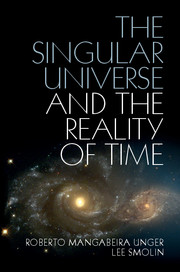Book contents
- Frontmatter
- Contents
- The nature and scope of this work
- Part I Roberto Mangabeira Unger
- 1 The science of the one universe in time
- 2 The context and consequences of the argument
- 3 The singular existence of the universe
- 4 The inclusive reality of time
- 5 The mutability of the laws of nature
- 6 The selective realism of mathematics
- Part II Lee Smolin
- Acknowledgments
- References
- A note concerning disagreements between our views
- Index
6 - The selective realism of mathematics
Published online by Cambridge University Press: 05 December 2014
- Frontmatter
- Contents
- The nature and scope of this work
- Part I Roberto Mangabeira Unger
- 1 The science of the one universe in time
- 2 The context and consequences of the argument
- 3 The singular existence of the universe
- 4 The inclusive reality of time
- 5 The mutability of the laws of nature
- 6 The selective realism of mathematics
- Part II Lee Smolin
- Acknowledgments
- References
- A note concerning disagreements between our views
- Index
Summary
The problem
A view of mathematics and of its relation to nature and to science complements the two ideas that are central to this argument: the idea that there is one real universe (as opposed to a multiplicity of universes, of which our universe would represent one) and the idea that time is real and touches everything (with the consequence that everything, including the laws of nature, changes sooner or later). These ideas make trouble for received accounts of mathematics and of its applicability in the scientific study of nature: they cannot be adequately accommodated within any familiar interpretation of the nature of mathematics. They require a different approach.
The core of this conception is that mathematics is an understanding of nature emptying the world out of all particularity and temporality: that is, a view of a world without either individual phenomena or time. It empties the world out of them the better to focus on one aspect of reality: the recurrence of certain ways in which pieces of nature relate to other pieces. Its subject matter are the structured wholes and bundles of relations that outside mathematics we see embodied only in the time-bound particulars of the manifest world.
- Type
- Chapter
- Information
- The Singular Universe and the Reality of TimeA Proposal in Natural Philosophy, pp. 302 - 348Publisher: Cambridge University PressPrint publication year: 2014



